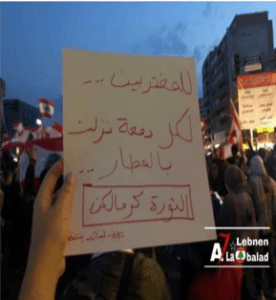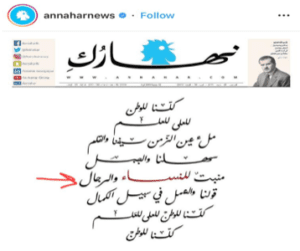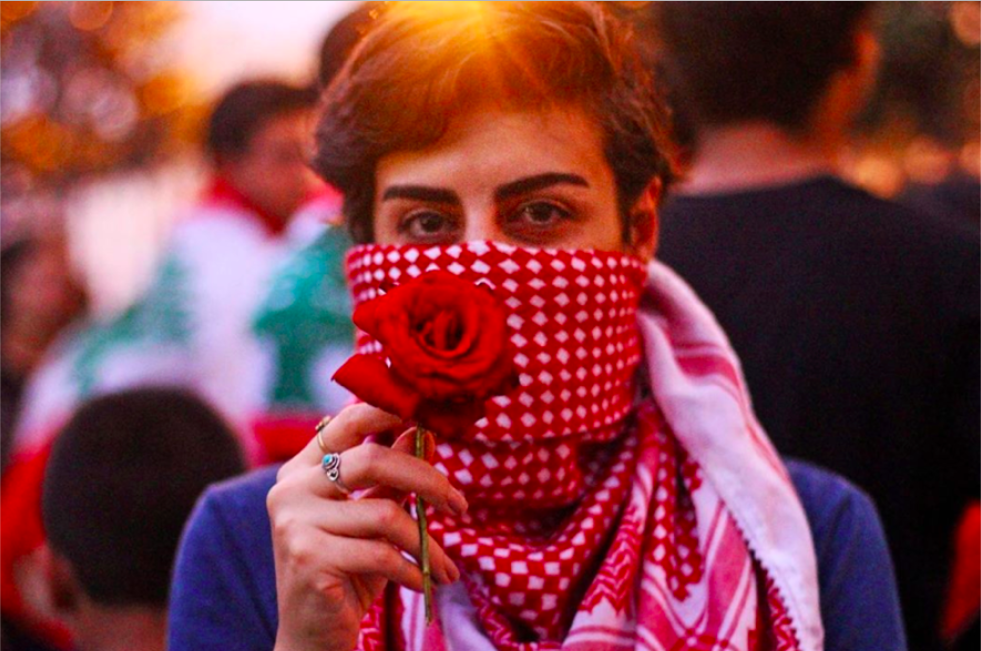SEGOVIA – He is in a plane, about to take off. He takes one deep breath, and blows her a kiss, goodbye… His tears slide down his cheeks. He takes a quick peak one last time out of the window. The plane takes off. He has left her behind.
She is also in a plane, about to take off. She takes one deep breath, and blows her a kiss, goodbye. Her tears slide down her cheeks. She takes a quick peak last time out of the window. The plane takes off. She has left her behind.

They left in search of a better opportunity.
”It is the dream; perhaps someday, soon, the youth can stop leaving, and we can finally build our country.”
Lebanese IE students, Cloe Attieh, Abdallah Kuraydli and one other student shared their views on the Lebanese October Revolution. International news coverage has claimed that the Lebanese population is protesting over plans to propose taxes on WhatsApp calls.
Ever since the Lebanese Civil War that ended around 30 years ago, the same political leaders have been in power, which has been brought to my attention by fellow student Cloe Attieh. They formed their own parties based on religious sectarianism. And here, the key issue comes to play; it is very hard for the parties to come to an agreement. It took them 12 years to set a budget, and at some point, it took them 3 years to select a president.”
The government has failed to do its job ever since the end of the war, and a clear example on this according to Abdallah Kuraydli is the drastic shift in their currency; what they once payed 50 cents for, they now pay 500 liras for.
The most basic necessities a citizen would ask for have faded away. Whether you have access to them or not is all based on your financial capabilities. ”We have been silent for 30 years. A lot of things were piling up…Things that have always been there, but we have never really pointed it out until now.”
”Wildfires erupted in all of Lebanon, and it was Jordan and Cyprus that sent the helicopters to stop the fires. It was not our own government that tried to save the country. We had perfectly good helicopters given to us in 2009, but they were not maintained because the politicians were too busy stealing money from this now-corrupted country.”
The people of Lebanon first and foremost demand that their basic necessities be met; clean water, a clean country, the provision of electricity 24/7…etc. They demand the resignation of the President, along with his government, to be replaced with a secular government. They demand that every politician be tried in court with open files demonstrating their utmost corruption. They demand social economic reform to beat the economic crisis Lebanon currently finds itself in, which is spiralling downwards quickly. Allegedly, the government has attempted to fix through the imposition of more taxes. Rather, I would address all this simply as a sole demand for justice.
The news media has failed to demonstrate that the proposed tax on WhatsApp calls was just the tip of the iceberg. One can grasp the power of the media in shaping and altering the news in the eyes of the watchers – the power they have in framing the news and setting the agendas. It is quite saddening that the world receives lies where it expects transparency and trust.
The proposal of taxes on several things including WhatsApp calls was ”what broke the camel’s back.” I find it funny and sad how the media fails to display that government efforts to mend the economic crisis was through the proposal of new taxes. It is their way of trying to mend everything that has been lost in the recent fires as well as through taxes. To me, it is quite illogical to solve the problem of people not having any money by making them pay some more. This is what led the people to take on the streets.
And so, social media has played a massive role in the protests, in the sense that it has shed a light on fake news and on the misrepresentation of the issue at stake. Whilst the fake media surrounding this issue has prompted discontent among the population, it has allowed the Lebanese population to voice their agony and speak out on all they are fighting for. It has compensated for the fact that international, and some might say national, media coverage was not covering the situations fully and giving the Lebanese population’s causes justice. It has allowed one to go to deeper than the surface of the situation. It is not a shallow matter, but international media coverage turned it into so, with those who do not know much about the Lebanese situation immediately falling for it.
Social media has made it clear that the Lebanese population are taking to the streets, and will not leave, until their demands are met – the demands that can be summed up in the famous political slogan ”Ash-sha’ab yurid isqat an-nizam!”, which translates to ”The people want to topple the regime!”

The first response came from the Prime Minister who asked to be given 72 hours to figure something out with the government. 72 hours later came a bill of idealistic propositions, but it was too late. ”He had already lost the trust of the people. They viewed it as nonsense and carried on with protests.”
Then came the President’s response. He supposedly spoke live on television about the revolution. ”The best part about this is that the President watched it live with us.” Everyone disregarded all he was saying, and all eyes went on how pre-recorded and badly edited the video was.
The Prime Minister resigned on October 26th. ”It is a victory, but not the victory. It is one of many demands. It is just proof that if we stay out on the streets, we are bound to be heard.”

The role of women in these protests is worth mentioning, specifically the prominent moment of which a woman karate-kicked a minister’s armed body guard (https://www.youtube.com/watch?v=zgCMgnUvnbM).
As an Arab female myself, many women in the Middle East are constantly undermined, unappreciated, and unacknowledged. And unfortunately, many Middle Eastern women still live behind the shadows of men and the bars of society. To see that women have been at the forefront of the Lebanese protests is definitely an aspect to highlight.
‘‘These women are proving that the patriarchal society is about to die, and the fact that we will all soon be equal I think, more than anything, displays how the whole of society is evolving as the protests go on.”

With that said, the involvement of women has been celebrated by local news as well, with Annahar News adding the term ”women” as seen in red in the image, beside ”men” in the Lebanese national anthem. It is beautiful that women are finally getting their place in Lebanon.”
I cannot help but wonder how it feels to be far away from home during this time. Does it make them feel separated from the cause? What have they or others have done to feel more connected and united?
”The most recurrent phrase I have heard this past few weeks in Arabic from my Lebanese friends studying abroad was ‘This is the most time I hate not being home It is killing me. I’ve tried so many times to go back. But my parents constantly refuse because they are worried that I will be able to go back to Spain if it gets worse, and the airport would close. ”
”It is touching on my fear of missing out. I left Lebanon due to its economic situation, knowing that if I stayed there, I would have no future. I would have very much preferred to be on the streets protesting and fighting against what led me to leave my own country in the first place. ”
All the students interviewed, however, stressed on how this does not separate them from the cause in any way. If anything, I would say it has made them more passionate and united. All around the world, Lebanese expats have created groups and united to protest together in their cities, even if they did not know each other – uniting against a common cause.
”We need a constitutional reform. We must stop sectarianism, and stop this parliamentary system, because it does not work in Lebanon. This revolution is in need of a leader. It needs a representative to go and talk to the government. We need a spokesperson. These protests are only the first step towards improvement. What has been corrupted for 30 years cannot be fixed in a few days or months. The citizens need to have the consistency and tolerance to continue with what they have started with.”






